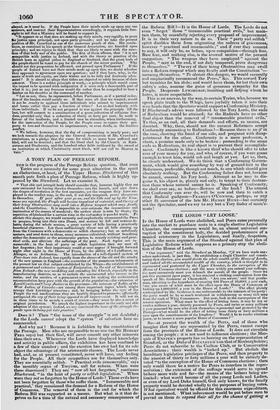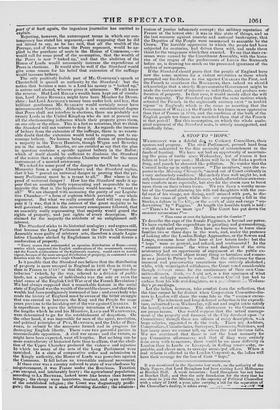THE LORDS " LET LOOSE."
IF the House of Lords were abolished, and Peers came personally into the market to purchase seats in a single elective Legislative Chamber, the consequences would be, an almost universal cor- ruption of the constituent body, the decided predominance of a monied aristocracy in the Legislature, and finally, despotism. This is the main argument of the Standard against that plan of Legislative Reform which supposes as a primary step the aboli- tion of the House of Lords.
"Our argument," said the Standard on Monday, ",lif we have made our- selves understood, is just this. By establishing a single Chamber and consti- tuting that elective, you would devote the whole wealth of the House of Lords, and indeed all the accumulated wealth of the country, which is thought to be represented and protected by the Upper Chamber, to the corruption of the House of Commons elections ; and the more widely you extend your suffrage, time more extensively must you debauch the morals of the people. Since we put this argument upon paper, it has received a striking confirmation from the speech of Mr. Gisborne at Chesterfield. Are you aware,' said that gentle- man, adverting to the hypothesis of creating 100 Peers of 10,0001. a year each, 'are you aware of what must be the effect upon the House of Commons of locking up 1,000,000/. a year in the House of Lords ? ' The effect plainly contemplated by Mr. Gisborne is one unfavourable to the interests of his party: the party would be by so much weakened in withdrawing so many rich men from the rank of Whig Commoners. But now, look to the consequence of the reverse operation. What must be the effect of letting loose, it may be ten or twelve millions a year, directly possessed by Peers, and twice as many millions a year possessed by men who think themselves represented and protected by the Peerage—what would be the effect of letting loose thirty or forty millions a year upon the constituencies of the kingdom ? Would it be to render elections purer, or to insure a more popular House of Commons? " So—at present the wealth of the Peers, and of those who imagine that they are represented by the Peers, cannot escape from the precincts of the House of Lords. It does not circulate among the people ; it is not used to influence elections; the Mar- quis of EXETER s property has no bearing on the representation of Stamford, or the Duke of BUCCLEUCH'S on that of Roxburghshire; Peers do not subscribe to the Carlton Club, or to Conservative Associations ; their wealth is "locked up." But abolish the hereditary legislative privileges of the Peers, and then property to the amount of thirty or forty millions a year will be entirely de- voted "to the corruption of the House of Commons elections ; then only would there be a motive for Peers to interfere in the repre- sentation ; the extension of the suffrage would serve to spread bribery more wide and far—the means of the bribers being un- limited: what would become of all the young Lords and Ladies, or even of my Lord Duke himself, God only knows, for the family property would be devoted wholly to the purposes of buying votes. What equivalent would be offered for this enormous expenditure, is not mentioned. What inducement would be put before men to prevail on them to expend their all for the chance of getting a part of it back again, the ingenious journalist has omitted to explain. Rejecting, however, the extravagant terms in which our con- temporary has stated his argument,—and supposing that he did not intend to say, as he has said, that all the wealth of the Peerage, and of those whom the Peers represent, would be ap- plied to the purchase of seats in the House of Commons,—we would call for some proof of the assumption, that the wealth of the Peers is now 4' locked up," and that the abolition of the House of Lords would necessarily increase the expenditure of Peers in elections. It would also be well if the Standard would give some reason for his belief that extension of the suffrage would increase bribery. The only positively foolish part of Mr. GISBORNE'S speech at Chesterfield is quoted as authority by the Standard: but the notion that because a man is a Lord his money is 4' locked up," is untrue and absurd, whoever gives it utterance. We all know the reverse. Had Lord ROLLE'S wealth been kept out of circula- tion, Lord JOHN RUSSELL might have been Member for Devon- shire ; had Lord ABINGER'S money been under lock and key, that brilliant gentleman Mr. SCARLETT would certainly never have misrepresented Norwich. Although it is a constitutional dogma that Peers shall not interfere in elections, there are probably not twenty Lords in the United Kingdom who do not at present use all the electioneering influence which their property gives them, on one side or the other. This is a fact so notorious, that we think the Standard will not venture to deny it. As regards the increase of bribery from the extension of the suffrage, there is no reason- able doubt that the extension would tend to repress, not to en- courage bribery. No human being would dream of purchasing a majority in the Tower Hamlets, though Wigan and Beverley are in the market. Besides, we are entitled ea say that the plan in question contains a specific against bribery in the Ballot; which of itself should be sufficient to disabuse the Standard of the notion that a single elective Chamber would be the mere instrument of a monied aristocracy.
We asked for some proof of the danger to the Church and the Monarchy from a single Chamber; and the Standard replies, that it has " proved an universal danger in proving that the pri- mary Parliament must be a tyrant to all." But where is the proof of universal danger ? How has the Standard made it ap- pear that an assembly truly representing and responsible to the majority (for that is the hypothesis) would become a " tyrant to all?" We are charged with assuming the purity of our Legisla- tive Chamber—" a form of sophism which pervades '' our whole argument. But what we really assumed (and will any one dis- pute it ?) was, that it is the interest of the great majority to be well governed; whence this necessary consequence followed, that an assembly really representing that majority would guard the rights of property, and just rights of every description. We claimed for the majority the attribute of an enlightened self- interest.
The Standard sticks to its historical analogies ; and argues still, that because the Long Parliament and the French Constituent Assembly were guilty of arbitrary acts, therefore a single Legis- lative Chamber elected by Englishmen in 1836 would decree a confiscation of property.
" Every reason that commanded an agrarian distribution at Rome—every motive which suggested the English confiscations of the seventeenth century, and the French confiscations of the eighteenth century, would exist in tenfold vigour, because of the more unequal distribution of property, to command a con- fiscation with the Spectator's single Chamber."
Is it possible that the Standard can believe that the distribution of property is more unequal in England in 1836 than in 1640, or than in France in 1789? or that the desire of an " agrarian dis- tribution" (which, by the way, referred to a division of public lands, not a spoliation of individuals) was the sole or even the chief cause of the English Civil War or of the French Revolution? We had always supposed that a remarkable feature in the social state of England was the wealth of the middle classes,and that their wealth had been prodigiously increased of late : and everybody who reads the history of England must be aware of the bitter struggle that was carried on between the King and the People for some years previous to the breaking out of the war against CHARLES. It is superfluous to prove the arbitrary intentions of CHARLES, or the lengths which he and his Ministers, LAUD and WENTWORTH, were determined to go for the establishment of despotism. On the other hand, it was impossible for men of the spirit, resolution, and political principles of Pvn, HAMPDEN, and the Duke of BED- FORD, to submit to the measures formed and in progress for destroying English liberty. There were two powerful parties in irreconcileable opposition. A civil war arose; and the victors, as might have been expected, went all lengths. But nothing can be more contradictory of historical facts than to affirm, that the aboli- tion of the Upper Chamber produced the violence and injustice by which too many of the acts of the Long Parliament were tarnished. In a state of comparative order and submission to the Kingly authority, the House of Lords was powei less against the Commons. It fell before an irresistible national movement.
If there ever was a country reduced to state of wretchedness by misgovernment, it was France under the Bourbons. Taxation ,,was unequal, and intolerably heavy ; the agricultural population, according to LA BRUYERE, looked more like brutes than human beings; the clergy were luxurious, inso!ent, and open revilers of the established religion ; the Court was disgustingly profli- gate; the finances in a state of alarming disorder; the adminis-
tration of justice infamously corrupt ; the military reputation of France at the lowest ebb: it was in this state of things, and as the last resource against anarchy and national bankruptcy, that the Deputies of the People were summoned to assemble by the Crown. The horrible oppression to which the people had been subjected for centuries, had driven them wild, and made them thirst for the vengeance which they exacted. To say that their ex- cesses were caused by the Constituent Assembly, with the histo- ries of the reigns of the predecessors of Louis the Sixteenth before us, is drawing too much on the presumed ignorance of the readers of newspapers.
If the Standard should prove that the people of England have now the same motives for a violent revolution as those which
prompted our forefathers to rise against CHARLES the First, and the French to overthrow the BOURBONS, then indeed we should acknowledge that a strictly Representative Government might be
made the instrument of injustice to individuals, and produce con- fiscation of property. In that case, it would merely effect the will of the majority. The Standard says that the same motives which actuated the French in the eighteenth century exist " in tenfold vigour" in England; which is the same as asserting that the Government of AVILLIAll the Fourth is ten times more oppressive than that of' France in 1789, and the condition of the bulk of the English people ten times more wretched than that of the French at that period ! But this assumption, on which the whole analo- gical argument of the Standard rests, is utterly unsupported, and manifestly false.



























 Previous page
Previous page